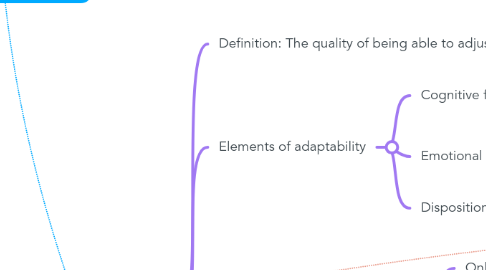
1. Lifelong Learning
1.1. Definition: The concept of pursuing additional education and the development of further skills beyond an individual’s formal or compulsory education. It is is generally voluntary and self-motivated based on a pursuit to learn more, gain new skills or support professional development (Clark).
1.2. Elements of life long learnining
1.2.1. Focus on growth
1.2.1.1. Have a growth mindset - appreciate challenges and see them as opportunities for personal growth.
1.2.2. Become a serial master
1.2.2.1. Continuously develope new deep areas of expertise throughout your career by pursuing additional education and certifications to stay relevant and valuable in a rapidly changing workforce.
1.2.3. Strech
1.2.3.1. Go outside of your comfort zone. When people work on tasks that aren’t entirely comfortable, they are said to be in their learning zone, where they acquire new knowledge and develop and practice new skills.
1.2.4. Build a personal brand
1.2.4.1. Craft and consistently communicate a clear, authentic professional identity that highlights your unique value proposition, expertise, and commitment to continuous growth and development throughout their career.
1.2.5. Own your development
1.2.5.1. Proactively set learning goals, track progress, seek feedback and mentorship, and make personal investments in your continuous professional growth beyond what your employer provides.
1.2.6. Do what you love
1.2.6.1. Finding work that aligns with one's passions, strengths, and sense of purpose is essential for lifelong well-being and fulfillment.
1.2.7. Stay vital
1.2.7.1. Stay vital through practices that promote physical and mental well-being, such as exercise, nutrition, sleep, and relaxation, is essential for maintaining the energy and resilience needed for lifelong learning and career reinvention.
1.3. Executive functioning skills needed for lifelong learning
1.3.1. Planning and Prioritizing
1.3.1.1. The ability to create a plan of action, and prioritize the different working parts is a strong sign of cognitive development.
1.3.2. Self-Monitoring Skills
1.3.2.1. Self-evaluate or comprehend how well he or she is performing a specific task.
1.3.3. Task Initiation
1.3.3.1. The ability to identify and complete the first step in a task or project.
2. Adaptability in different learning environments
2.1. Definition: The quality of being able to adjust to new conditions.
2.2. Elements of adaptability
2.2.1. Cognitive flexibility
2.2.1.1. To be nimble in your thinking and to anticipate multiple ideas and scenarios to shift and change for best outcomes
2.2.2. Emotional flexbility
2.2.2.1. To understand, be attentive, and flexible with your emotions and those of others
2.2.3. Dispositional flexibility
2.2.3.1. To maintain a positive outlook and attitude
2.3. Different learning environments
2.3.1. Online learning
2.3.1.1. Also known as distance education or eLearning, refers to the delivery of educational content and instruction through the internet.
2.3.2. Study groups
2.3.2.1. A place where you can ask questions, practice participation, and get to know your classmates in a smaller setting.
2.3.3. Seminars
2.3.3.1. An educational event in which a group of people gather together to learn more about a certain topic or subject.
2.3.4. Lectures
2.3.4.1. The teacher speaks and students listen. Teachers can quickly deliver a lot of information using this way.
2.4. Executive functioning skills needed for adaptability
2.4.1. Flexible thinking
2.4.1.1. Getting comfortable with change and managing uncertainty.
2.4.2. Emotional control
2.4.2.1. To have control over when and how we experience emotions
3. Effective studying habits
3.1. Definition: Habits that assist students in efficiently learning the subject matter.
3.2. Studying habits
3.2.1. Avoid procrastination & cramming
3.2.1.1. It might be tempting to leave all your studying for that big exam up until the last minute, but research suggests that cramming does not improve longer term learning.
3.2.2. Plan ahead
3.2.2.1. Having a study plan with set goals can help you feel more prepared and can give you a roadmap to follow.
3.2.3. Take breaks & reward yourself
3.2.3.1. Studies have shown that wakeful rest plays just as important a role as practice in learning a new skill. Rest allows our brains to compress and consolidate memories of what we just practiced.
3.2.4. Set specific goals
3.2.4.1. Setting specific goals along the way of your studying journey can show how much progress you’ve made.
3.3. Executive functioning skills needed to study effectively
3.3.1. Self-regulation
3.3.1.1. The ability to understand and manage your behaviour and your reactions to feelings and things happening around you.
3.3.2. Self-monitoring
3.3.2.1. The ability to observe and evaluate one's behavior.
4. Leadership development
4.1. Definition: Leadership, both as a research area and as a practical skill, encompasses the ability of an individual, group, or organization to "lead", influence, or guide other individuals, teams, or entire organizations.
4.2. Leadership skills
4.2.1. Relationship building
4.2.1.1. A great leader uses these relationships to work with and influence others to achieve common goals and build a shared vision.
4.2.2. Decision-making
4.2.2.1. Effective leaders must be able to analyze information, weigh options, and make informed decisions that are in the best interest of the organization.
4.2.3. Conflict management
4.2.3.1. A skill that leaders must employ when needed to help foster a productive working environment.
4.2.4. Negotiation
4.2.4.1. The soft leadership skill because you use persuasion and not coercion. Negotiation skills also include communication, planning, and active listening.
4.2.5. Critical Thinking
4.2.5.1. By thinking critically, leaders can make informed decisions, solve problems, and communicate their ideas more effectively.
4.2.6. Agility and adaptability
4.2.6.1. A leader who is adaptable can quickly adjust to new situations and changing circumstances, making the necessary changes to achieve success.
4.2.7. Lifelong learning
4.2.7.1. Continuous learning is vital for leadership because it enables leaders to adapt to changing environments, stay relevant, and improve their ability to lead teams and organizations effectively.
